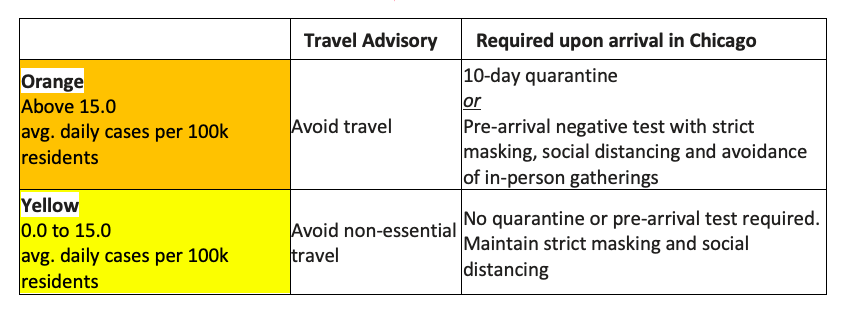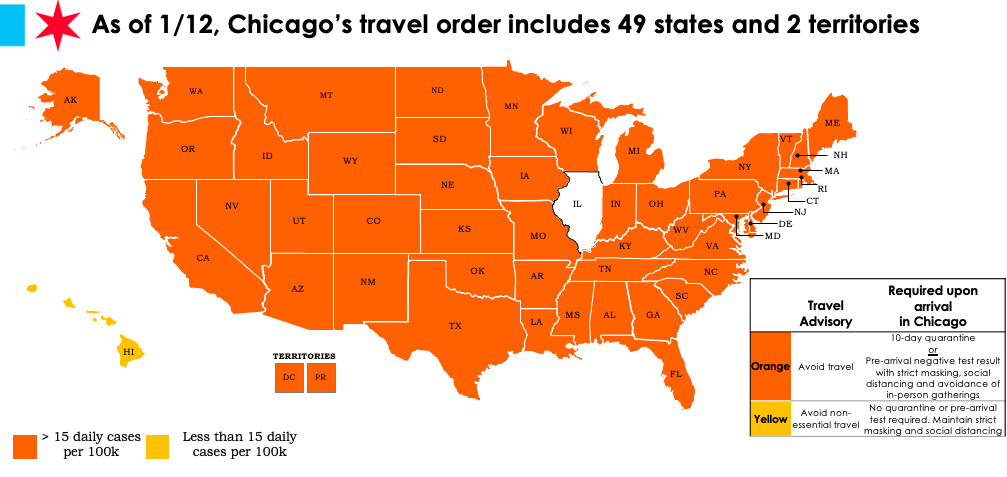Chicago Department of Public Health modifies Emergency Travel Order to prevent further spread of COVID-19 in Chicago
January 11, 2021
Alyse Kittner alyse.kittner@cityofchicago.org
CHICAGO – The Chicago Department of Public Health has updated the Emergency Travel Order to provide clearer guidance to those traveling to and from the city as it works to stem the further spread of the virus. Starting January 15, the travel order will be divided into two levels instead of three: orange states and territories above 15 cases per day, per 100,000, and yellow states and territories below 15 cases per day, per 100,000.
The travel order criteria have been revised to combine the "red" and “orange” categories, so all formerly "red" states have been moved to "orange" tier restrictions, regardless of how their case rate has changed or how it relates to Chicago’s case rate. Previously, the red states were those with a higher daily case rate per 100,000 than Chicago.
The travel order criteria have been revised to combine the "red" and “orange” categories, so all formerly "red" states have been moved to "orange" tier restrictions, regardless of how their case rate has changed or how it relates to Chicago’s case rate. Previously, the red states were those with a higher daily case rate per 100,000 than Chicago.
The guidance for each tier is:
- Yellow: States with a rolling 7-day average less than 15 cases/day/100k residents.
- No quarantine or pre-arrival test required. Maintain strict masking, social distancing and avoidance of in-person gatherings
- Orange: States have a rolling 7-day average above 15 cases/day/100k residents
- 10-day quarantine OR pre-arrival negative test no more than 72 hours before arrival in Chicago with strict masking, social distancing and avoidance of in-person gathering
Hawaii is the lone yellow state and all 49 other states are in the orange category, as are Puerto Rico and the District of Columbia.
Chicago’s quarantine list is updated every other Tuesday and goes into effect the following Friday at 12:01 a.m. The list will be updated again on Tuesday, January 26, 2021. Regardless of category, people are urged to avoid non-essential travel and to follow standard COVID-19 mitigation practices such as wearing a mask, washing hands frequently, and social distancing.
As a reminder, essential workers are exempt if they must travel for work but must limit their activities to work-related activities and avoid public spaces as much as possible. Exceptions to the Order also apply to personal travel for medical care and parental shared custody reasons, commuters, as well as travelers passing through designated states for less than 24 hours in the course of travel. However, if your final destination is a state on the designated list, then you must follow the Order, even if you are in that state for less than 24 hours.
Chicago has experienced several weeks of mostly stable or declining new daily cases, and the test positivity rate has decreased and is now 10.3%. The city is now seeing 38 new daily cases based on a 7-day rolling average, which is a lower rate than when the 3-tiered system was implemented in November 2020.
Quarantine helps prevent the spread of disease before a person knows they are sick, including if a traveler has been infected with the virus but does not have symptoms. In this order, quarantine means staying at a single designated home or dwelling for 10 days before doing any activities outside of the home or dwelling. People in quarantine should separate themselves from others as much as possible and check themselves for symptoms. The requirements to safely quarantine can be found here.
The City’s goal is to educate travelers about the order, and it is communicated through signage at O’Hare and Midway airports, on highways and roadways, as well as through City websites and social media channels.
The Commissioner of Health may grant additional exemptions based upon an organization’s or business’ testing and other control policies.
Essential workers are defined as individuals who work in critical infrastructure as designated by the Cybersecurity and Infrastructure Security Agency. They are exempt from the requirement to self-quarantine and/or pre-arrival testing if traveling for work purposes, certified in writing by the worker’s employer and made available for review by authorized officials from the Chicago Department of Public Health and Chicago Police Department. This includes any state, local, and federal officials and employees, including members of the military, traveling in their official capacities on government business.
Such essential workers traveling for work purposes are subject to requirements that include limiting their activities to work-related activities and functions that directly support their work-related activities and avoiding public spaces as much as possible.
There are other exceptions to the order, as well. For example, it does not apply to any individual passing through designated states for a limited duration (less than 24 hours) through the course of travel, such as travelers changing planes at certain airports or driving through designated states. Additionally, exceptions are in place for daily commuters to and from neighboring states.
The quarantine and pre-arrival testing requirements apply to people even if they have no COVID-19 symptoms, and even if they have had the COVID vaccine. Travelers coming from international locations should review the Centers for Disease Control travel recommendations by country and follow Illinois Department of Public Health guidance.
We continue to closely monitor the spread of COVID-19 in other regions across the country. For more information, visit chicago.gov/coronavirus


